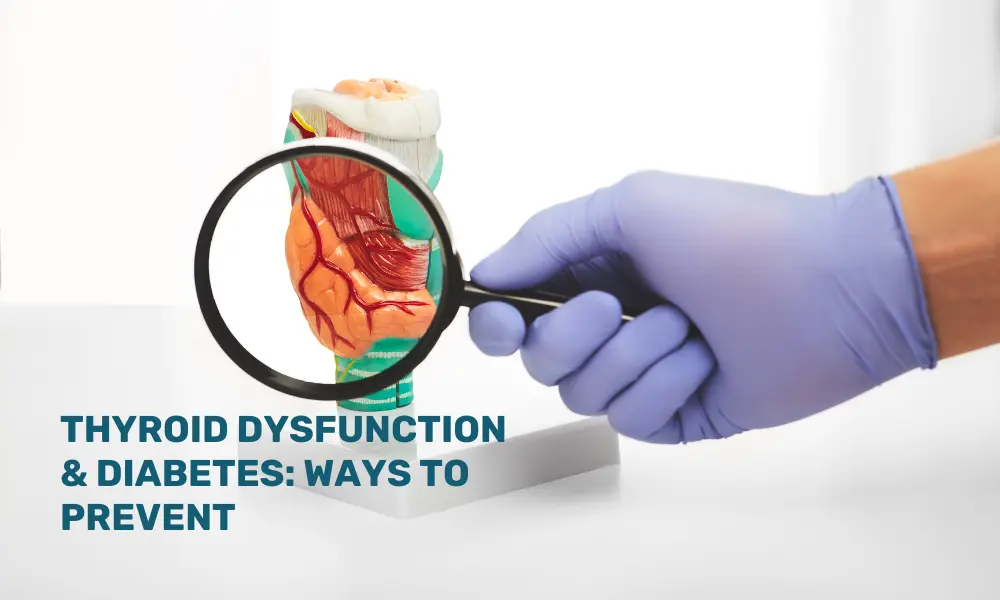Thyroid dysfunction is the most significant risk for diabetes. Its pathogenic mechanisms are related to the modulation of metabolism, insulin sensitivity, and autoimmune processes. Any thyroid disorder, including both hypothyroidism and hyperthyroidism, leads to hyperglycemia through several mechanisms. Knowledge of managing thyroid disorders is hence fundamental to reduce the risk of diabetes.
How Hypothyroidism Can Lead to Diabetes
Hypothyroidism is the state of the thyroid gland when it is underactive, thus decreasing the metabolism, increasing predisposition to gain weight, and increasing insulin resistance. It slows down the degradation of insulin while increasing sensitivity to exogenous insulin. This makes an individual suffering from pre-existing diabetes suffer from hypoglycemia if their dose of medication or insulin stays the same.
Hyperthyroidism accelerates metabolism and increases insulin degradation. It may lead to hyperglycemia. Autoimmune mechanisms through cross-reactivity also increase the risk for type 1 diabetes with autoimmune thyroid diseases.
Lifestyle Changes to Prevent Diabetes Risk
A healthy lifestyle is also a crucial prevention tool for diabetes among patients with thyroid disease. Lifestyle interventions include:
Food intake: One can keep blood sugar in control by having a diet low in carbohydrates and low in refined carbohydrates but rich in fiber.
Physical activity: Regular aerobic and strength exercises aid in proper blood sugar control. Patients should do low-intensity exercises, which they are to increase gradually over time, in cases of uncontrollable thyroid diseases.
Stress Management: Adequate management of stress through meditation or even an area like yoga can have a massive role in keeping an individual’s hormones and overall body in perfect condition.
Early Detection
Even in the absence of diabetes, thyroid individuals should have their blood sugar checked. They should see a doctor once a year for early diagnosis of prediabetes or diabetes. Individuals must also be on the lookout for signs and symptoms that might be related to diabetes, such as:
-
Increased thirst (polydipsia)
-
Increased urination (polyuria)
-
Unintended weight loss
-
Constant fatigue
In case any of these symptoms occur, blood sugar and thyroid function tests must be run promptly to diagnose the case and take proper measures for treatment. Patients with thyroid problems can prevent or at least reduce their chances of developing diabetes through balanced lifestyles, regular check-ups, and prompt responses to early signs and symptoms.
T3, T4, TSH Blood Tests
The thyroid gland generates hormones that are necessary for several bodily functions. When it fails to operate effectively, it can cause a variety of health problems, from simple concerns like weariness to more serious disorders like heart disease.
Blood tests are used in routine screening to determine thyroid hormone levels, namely thyroid-stimulating hormone (TSH), free thyroxine (T4), and free triiodothyronine (T3). These tests give vital insights into thyroid function and can detect issues before symptoms appear.
The Thyroid Stimulating Hormone (TSH) test determines if your thyroid is adequately functioning. It is the major diagnostic tool for thyroid diseases. Free T4 and T3 levels assess the active hormones accessible to the body’s organs and tissues, providing a more accurate picture of thyroid health.
Regular thyroid tests are especially important for anyone with a family history of thyroid disease, women over the age of 35, and those who have unexplained symptoms.
Thyroid Antibody Test detects the presence of antibodies against thyroid tissue and can help in the diagnosis of autoimmune thyroid disorders, such as Graves’ disease or Hashimoto’s thyroiditis. It is critical for determining if your thyroid problems are caused by an autoimmune reaction.
If you are experiencing signs of thyroid dysfunction, such as sudden weight fluctuations, mood swings, irregular heartbeats, or changes in energy levels, you should get a thyroid test. This test may also be required due to a family history or certain medical issues.
Understanding the reasons for thyroid disorders is critical for prevention and successful management. Early thyroid screening ensures timely diagnosis, enabling effective management, preventing complications, and promoting overall health and well-being.
Disclaimer: This article is meant for informational purposes only and must not be considered a substitute for professional advice.





